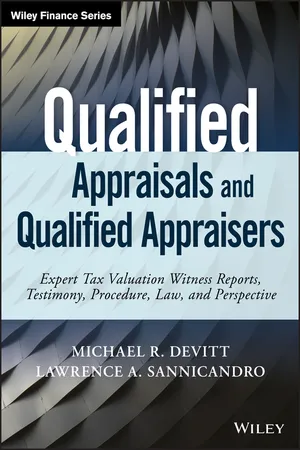
Qualified Appraisals and Qualified Appraisers
Expert Tax Valuation Witness Reports, Testimony, Procedure, Law, and Perspective
- English
- ePUB (mobile friendly)
- Available on iOS & Android
Qualified Appraisals and Qualified Appraisers
Expert Tax Valuation Witness Reports, Testimony, Procedure, Law, and Perspective
About This Book
Decode IRS appraisal regulations and find practical solutions to current issues
Qualified Appraisers and Qualified Appraisals provides clarification on complex IRS guidelines, and offers solutions and insight that can help appraisers adhere to the latest Treasury Regulations concerning appraisals submitted in tax matters. From the Uniform Standards of Professional Appraisal Practice to IRS regulations, this book explores the body of law that has arisen around the production of "qualified appraisals" that the government and courts will accept. The discussion covers estate, gift, charitable contribution, income taxes, and more, with expert guidance on the interpretation and application of complex regulations. As appraisers often are called upon to provide expert testimony in court, this book shares effective methods including the novel "hot-tubbing" technique that eliminates the appearance of bias in favor of a less-adversarial discussion. Cases are dissected as they relate to application of existing appraisal laws, and the companion website features checklists, references, and additional cases as they become available.
The IRS regulations on qualified appraisers and qualified appraisals have sparked a storm of controversy, and have raised more questions than they have answered. This book acknowledges the problems and offers solutions to help appraisers produce work the IRS and courts will accept.
- Understand the laws surrounding "qualified appraisals" and "qualified appraisers"
- Gain insight on testifying as an expert, including new techniques
- Explore solutions to common issues the IRS raises with respect to qualified appraisals and qualified appraisers
- Examine cases that illustrate the nuances of appraisal law application
In order for an appraisal to satisfy the government, an appraisal must be performed by a "qualified appraiser" specific for the type of property in question. This broad statement leaves much to question, but Qualified Appraisers and Qualified Appraisals provides the answers appraisers need to comply with the law and produce work that meets the latest standards.
Frequently asked questions
CHAPTER 1
Tax Valuation and the Necessity for Expert Appraisals
SUMMARY
THE NEED FOR VALUATION EXPERTS
Valuation in Tax Reporting
- Claiming a charitable contribution deduction of more than $5,000 where the donated property is not cash, publicly traded securities, a qualifying vehicle, or certain intellectual property;3
- Valuing assets of charitable remainder trusts;4
- Valuing claims and counterclaims against an estate;5 and
- Transferring property to a qualified settlement fund.6
- Charitable contribution deductions, including, but not limited to, donations to real property, personal property, grants of air rights, development rights, and conservation easements;
- Business formations;
- Inventory valuations;
- Corporate mergers, acquisitions, and spinoffs;
- Allocations of purchase price under section 1060 of the Internal Revenue Code;
- Business liquidations or reorganizations;
- Financings;
- Initial public offerings;
- Goodwill (both personal goodwill and business goodwill);
- Intangibles, including valuation of intangibles for transfer pricing purposes;
- Employee stock ownership plans;
- Retirement plan actions;
- Incentive stock options;
- Compensation received as property;
- Buy–sell agreements and related consequences;
- Stockholder disputes and related consequences;
- Mark-to-market valuations under section 475 of the Internal Revenue Code;
- Exchanges of property;
- Estate tax returns;
- Gift tax returns;
- Determinations of reasonable compensation;
- Foreign account reporting (e.g., in connection with reporting Form 8938, Statement of Specified Financial Assets);
- Collection cases, especially where an offer in compromise is requested (note, Form 433-A, Collection Information Statement for Wage Earners and Self-Employed Individuals, and Form 433-B, Collection Information Statement for Businesses, require valuation of real estate and businesses); and
- Marital dissolutions and related reporting.
Valuation in Tax Litigation
- Substantial valuation misstatement penalty cases; and
- Gross valuation misstatement penalty cases.
A witness who is qualified as an expert by knowledge, skill, experience, training, or education may testify in the form of an opinion or otherwise if:
- the expert's scientific, technical, or other specialized knowledge will help the trier of fact to understand the evidence or to determine a fact in issue;
- the testimony is based on sufficient facts or data;
- the testimony is the product of reliable principles...
Table of contents
- Cover
- Title Page
- Table of Contents
- Foreword
- Foreword
- Preface
- CHAPTER 1: Tax Valuation and the Necessity for Expert Appraisals
- CHAPTER 2: Qualified Appraisal
- CHAPTER 3: Qualified Appraiser
- CHAPTER 4: Substantial Compliance vs. Strict Compliance
- CHAPTER 5: Government Expert Witnesses
- CHAPTER 6: The Practicalities of Selection and Preparation of Experts
- CHAPTER 7: From Daubert to Boltar
- CHAPTER 8: Discovery of Expert Material
- CHAPTER 9: Expert Appraisal Reports
- CHAPTER 10: Assessing the Quality of the Appraisal Report
- CHAPTER 11: Concurrent Evidence: A Novel Approach to Expert Testimony
- CHAPTER 12: Penalties Associated with Faulty Appraisals
- CHAPTER 13: Attorney Involvement
- CHAPTER 14: Common Errors with Appraisal Reports and How to Avoid Them
- Table of Cases
- About the Authors
- Index
- End User License Agreement